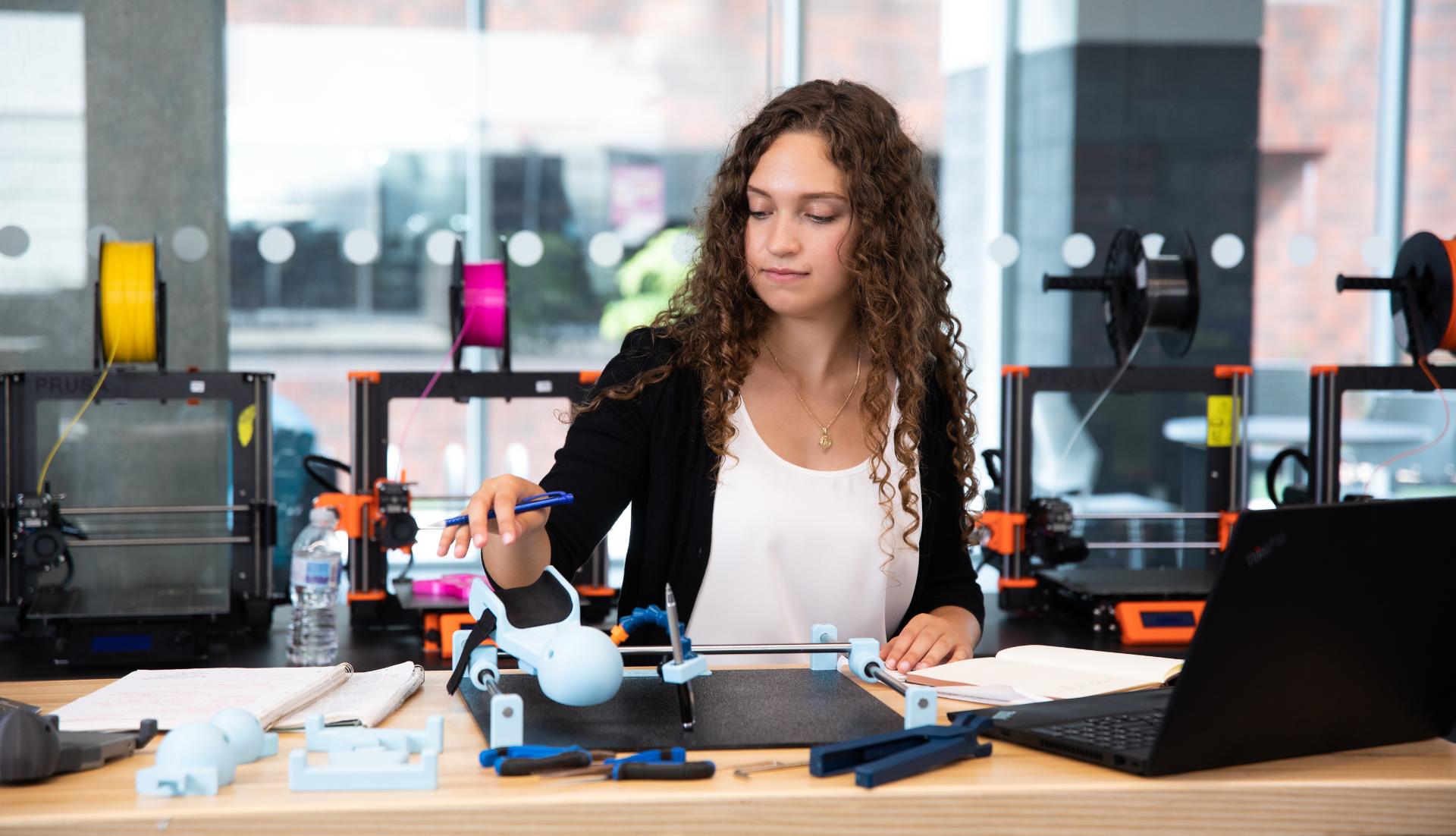-


Canadian engineer's device helps patients with limited hand mobility paint and draw
McMaster engineering student Lianna Genovese wins the Canadian James Dyson Award 2021 for her invention: Guided Hands.
August 25, 2021
In North America, there are over 58 million people of all ages experiencing limited hand mobility, hand and arm weakness and difficulty grasping and controlling objects, because of a medical condition or injury. This includes people living with Cerebral Palsy, Multiple Sclerosis, Muscular Dystrophy, and even those recovering from spinal cord injuries and strokes. Performing daily activities like writing, drawing, painting, and accessing technology become very difficult or even impossible. As a result of the physical limitation these individuals experience a loss of independence, self-expression, social exclusion, and frustration.
McMaster University biomedical and mechanical engineering student Lianna Genovese was inspired to innovate towards solving a real human problem and directed her energy into creating solutions that supported people with limited hand mobility in their hobbies and passions.
At 18 years old, Lianna channelled her natural entrepreneur spirit and engineering knowledge to develop Guided Hands™: a mechanical assistive device that enables anyone living with limited hand mobility to write, paint, draw and use a touch-screen device. This innovation has been awarded the national James Dyson Award, an design award that seeks to celebrate and inspire the next generation of engineers.
Inspired by the mechanics of a 3D printer, Guided Hands™ uses a simple sliding system composed of linear shafts and ball bearings. The unique system promotes controlled and guided hand movements in all directions (horizontal, vertical and swivel hand motions), as the user holds a handpiece custom to the size of their hand and level of hand impairment. The handpiece is connected to an arm attachment that holds various writing utensils (paintbrush, pen, marker, stylus, etc.) and is designed to use the patient’s gross motor skills in their shoulder to perform activities rather than relying on fine motor skills in the hand which are often compromised.
The first prototypes of Guided Hands™ consisted of pipe cleaners, straws and a sponge. Lianna immediately had Elissa test the prototype and provide feedback to inspire many iterations. Over the past two years, Lianna has connected with over 150 patients of varying medical conditions, neurologists, and occupational therapists across Canada to help inform her design and perfect the device.
-

-
Lianna Genovese, James Dyson Award Canada 2021 winner
“I met a woman named Elissa who lives with Cerebral Palsy, and after hearing her story about losing her ability to paint – a talent and passion she had lost due to the progression of her condition, I knew I had to find a solution. I wanted to help give her back her passion and contribute to a better quality of life.”
"It was important to me to test Guided Hands™ in real world scenarios and get in-person feedback. After meeting with a little girl named Bella, a child with Cerebral Palsy, and witnessing the smile on her face as she wrote, coloured, drew and played games on an iPad, I knew I had found my passion. I realized that what started off as a school project could become a real-world solution that could help change the lives of many people.”
Existing devices to assist with fine motor skills do not support controlled and guided hand movements, focusing instead on only allowing the user to hold a writing utensil or reduce tremors. The Guided Hands™ design is the only product that offers multiple ambidextrous handpieces and uses a unique sliding system to glide the hand seamlessly during an activity.
Today, at 21 years old, Lianna is the CEO & Founder of her own company called ImaginAble Solutions and has launched healthcare pilots for Guided Hands™ across North America to further test with patients and health professionals. Her company will be launching Guided Hands into the market at the end of August 2021 making the device available to people across Canada and the USA.
As the National James Dyson Award winner for Canada, she has received $3,500 to go towards her innovation and will progress to the international stage of the James Dyson Award.
National Runners-Up
-
Zerosion
James Zvaros-Bairos and Samir Khaki– University of Toronto
Zerosion is a comprehensive system for identifying and preventing soil degradation in agriculture. Using AI, Zerosion analyzes images to automatically detect erosion. Innovations in surface covering and soil anchoring are used to further prevent erosion.
ALGOBIO
Anneke van Heuven and Elias Trouyet – University of Waterloo
A non-toxic bio-based flame retardant that keeps people safe from the fast spread of fire without causing any long-term health impacts. ALGOBIO is a non-toxic flame retardant made from renewable resources, which is safer for humans and the environment.
-
1 Taken from official National Health Service (NHS) and Office of National Statistics (ONS) data
2 Taken from official National Health Service (NHS) and Office of National Statistics (ONS) data
3 Taken from official National Health Service (NHS) data in November 2020
4 Department of Homeland Security. (2015). Stop the Bleed. [online] Available at: https://www.dhs.gov/stopthebleed
5 Hammett, E. (2020). How to help someone who has been stabbed or is seriously bleeding. [online] First Aid for Life. Available at: https://firstaidforlife.org.uk/knife-crime-serious-bleeding/
6 Hammett, E. (2020). How to help someone who has been stabbed or is seriously bleeding. [online] First Aid for Life. Available at: https://firstaidforlife.org.uk/knife-crime-serious-bleeding/
7 Sugrue, M., Balogh, Z., Lynch, J., Bardsley, J., Sisson, G. and Weigelt, J. (2007). GUIDELINES FOR THE MANAGEMENT OF HAEMODYNAMICALLY STABLE PATIENTS WITH STAB WOUNDS TO THE ANTERIOR ABDOMEN. ANZ Journal of Surgery, 77(8), pp.614–620.





